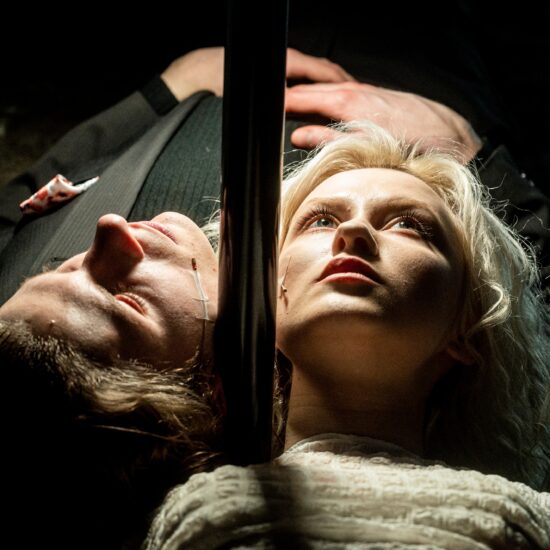OTHELLO
“I do not think, that it is possible today to stage “Othello” in a traditional way, as the tradition of staging “Othello” has been covered by the layers of racism, colonialism and patriarchy which today we consider as unacceptable. These layers seem to completely obscure the real meaning of Shakespeare’s “Othello”, which, on par with other tragedies of Shakespeare, is the collision between the traditional and the modern. The prominent contemporary philosopher Gilles Deleuze considers the traditional patriarchal world as the arborescent molar structure. The arborescent here means hierarchy, the molar means immobility and stagnation. An army is the best example of such arborescent molar structure. This structure encounters an altogether different structure, which is molecular, fluid and non-hierarchical. Such structure is completely flat, infinite and non-centered. It appears as the guerrilla warfare or Juliet, which in her balcony exclaims that “a rose by any other name would smell as sweet.” What she does claim by telling these words is literally a revolution. She claims that we can never identify the essence of the rose by putting it into the frame of tradition. She rejects the arborescent molar hierarchy and the conflict of the clans and in such a way abolishes the traditional antagonism of the Montagues and the Capulets. These families identify themselves as the eternal enemies. Such eternal war has formed both their identity and tradition. Juliet becomes a guerrilla soldier and holds her love as a weapon. She crosses all the Rubicons by giving her heart for Romeo the enemy. According to Juliet, times have changed, as one should discard traditions, family names, old definitions and customs and to look for an essence, which is always under construction in the present. Whereas all the Veronese still dwell in the Middle Ages, Juliet is already the child of the Renaissance. It is similar with Desdemona in the old Venice. Secretly, in a guerrilla way, Desdemona falls in love with Othello and in such a way tramples the arborescent, molar and medieval traditions of Venice. His father loudly protests against such a union. The parents of Juliet confront the love of their daughter and by ruining her ruin their own dynasty as Juliet is their sole daughter. It is similar in “Othello,” even more terrible: Iago forces Othello himself to kill Desdemona. At the same time Othello ruins himself as the only general able to save Venice.
Shakespeare asserts that the tradition which rejects modernity condemns itself to death. Having finished the Wittenberg University, Hamlet obeys the medieval injunctions of his father of the “eye for an eye” and in such a way kills Ophelia, her father and brother, the king and the queen, himself and all the Denmark – there is no one who could confront the army of the Norwegian Fortinbras. In „Othello“ Iago acts in a Machiavellian way by using all the traditional stereotypes for achieving his aims and winning his arguments. He infects Desdemona’s father with racism and forces Othello himself to doubt his honor of military chief and husband. He plays with the darkest emotions as the devil’s influencer, utilizing the traditional definitions of the good. As the Facebook algorithm he seeks for our needs and fears. As he finds our Achille’s heel he pushes it so hard that we become the black sheep fighting for his aims. We raise wars, hate each other and, most importantly, become jealous. It is the most despicable and most effective government – government of fear and envy. He forces Othello to return to the arborescent hierarchical army methods. Othello obeys him by turning against his love, against his true nature and ruins himself.
In these times, the union of Othello and Desdemona, discarding the racial differences, could be called non-traditional. In our days we in Lithuania experience the collision between the traditional and non-traditional family as well as the problems with gender. It is basically the collision of the traditional and the modern, which repeats in Europe since the Middle Ages, and its matrix is visible in Shakespeare’s tragedies. This dilemma explains choosing the black woman as Othello. It allows us to feel the traditional limits that Desdemona has crossed. On the other hand, if in the Shakespearean times it was normal for men to perform women, today it should be normal for women to perform men. By the way, in the traditional patriarchal society Deleuze sees man as molar and woman as molecular. According to him, creation is only possible on the molecular plane, only in becoming woman and finally in becoming imperceptible. It is especially visible in theatre. The acting is the art of re-embodiment. Here, sex or age or other restrictions do not matter.
The case of the actress Oneida Kunsunga – Vildžiūnienė is particular. As a black woman she had some extraordinary experiences in Lithuania, which is still a closed, racist, homophobic, fearful, aggressive, society. But the main cause of her taking such role is her extraordinary talent. „The actor is an athlete of the heart”, Antonin Artaud used to say. I did not find a more athletic heart for a role of Othello than Oneida.” Oskaras Koršunovas
Producer: OKT/Vilnius City theater
Supported by Lithuanian council for culture and “TheAtrium”
Selection of Avignon festival 2020
Set designer
Oskaras Koršunovas, Julija Skuratova
Costume designer
Julija Skuratova
Composer
Antanas Jasenka
Video artist
Artis Dzerve
Improvisation for guitar author and performer
Džiugas Gvozdzinskas
Choreographer
Vesta Grabštaitė
Lights designer
Eugenijus Sabaliauskas
Director’s assistant
Jokūbas Brazys
Literature adviser
Kasparas Pocius
Technical director
Mindaugas Repšys
Sound technician
Ignas Juzokas, Edvardas Kašincevas
Props and costumer
Laura Aurylaitė
Stage manager
Malvina Matickienė
Subtitling
Aurimas Minsevičius
Touring manager
Audra Žukaitytė
Cast
Oneida Kunsunga-Vildžiūniene, Digna Kulionytė, Saulius Ambrozaitis, Sofija Gedgaudaitė, Karolis Norvilas, Miglė Navasaitytė, Gerda Čiuraitė, Džiugas Gvozdzinskas, Aurelijus Pocius, Džiugas Grinys, Domantas Starkauskas
Premiere
2021 July 19



